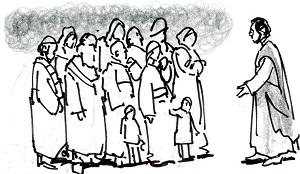

“I do believe, help my unbelief´ (Mark 9: 24).
James 3:13-18; Mark 9: 14-29
Today’s Gospel narrative immediately follows the Transfiguration, the revelation on the mountain of Jesus in glory as he prepares to go to Jerusalem to fulfill the Law and the prophets. When Jesus, Peter, James and John rejoin the other disciples, a desperate father is pleading for his possessed son, whom the disciples have been powerless to help. Jesus interviews and encourages the father to have faith, eliciting his heart-wrenching cry, “I do believe, help my unbelief!” After expelling the unclean spirit, Jesus meets in private with his disciples, shaken by their inability to command the spirit. Jesus tells them that “This kind can only come out through prayer.”
The connection between this scene and the Transfiguration is significant. The closer Jesus is to fulfilling his mission, the more dramatic becomes the demonic opposition and the effort to undermine the faith of the disciples. This demon, who has had free hand in abusing the boy, is no ordinary spirit. We are reminded of Luke 4:13 that after tempting Jesus in the desert, Satan withdraws “until an opportune time.” Now is that time, and from this point on Jesus will encounter more and more opposition until his death on the cross. His disciples will retreat in fear, abandoning him. One of them will betray him, and Peter, his chosen successor, will deny even knowing him.
In his 2019 biography of Pope Francis, Wounded Shepherd, author Austen Ivereigh explores the pope’s acceptance that his role in the reform of the church will bring its own share of suffering and failure in imitation of Jesus. The deepest wounds he has encountered have come from within the church, from intransigence to change, plots to undermine him and sow division, and the scandal of sex abuse and cover up embedded in a culture of clerical privilege and denial. Structural changes to force transparency and accountability will not be enough to root out the causes if the spirit of corruption is not confronted and driven out. For this, the pope has focused on prayer, for these are not ordinary unclean spirits, but a profound and baleful show of evil that threatens to paralyze the church at a time when the world is facing its own crises of leadership, moral integrity and hope.
The Word of God comes to us at a time when an ominous shadow seems to hang over both church and nation. The forces of good seem scattered while the threat of economic corruption and political paralysis only grows. Hope requires more than a realignment of power or even changes in leadership, as long as the underlying values and principles are not renewed. The cost of this renewal will test us all, and faith will need prayer to sustain us if we are to hear and respond to the Spirit God is sending out over the whole world and into our hearts. We cry out, “We believe, help our unbelief!” Jesus says in reply, “Everything is possible for those who have faith.”
Advertisement




